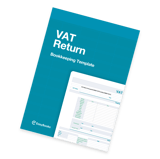Keeping track of business expenses is one thing, but calculating them is another. From office expenses to travel costs, you want to make sure you’re claiming back what you’ve incurred.
When calculating your business expenses, you have two options: manual and digital. We’ve explored both ways so you can find what works best for you and your business.
- Manually Calculating Expenses for Small Businesses
- Digitally Calculating Expenses for Small Businesses
Manually Calculating Expenses for Small Businesses
Managing your business’ finances and revenues can be a time-consuming and tedious task, on top of your everyday responsibilities. HMRC doesn’t require you to store every single receipt - but you have to make sure to keep business-related ones somewhere safe. This is so you can calculate and claim business expenses more efficiently.
Many small business owners prefer to handle this aspect of their businesses themselves, without the need to incur costs for an accountant.
Spreadsheets are familiar to most and have served as a way of keeping track of expenses for many years now. However, even if you update your expenses and receipts regularly and have an organised filing system, it doesn’t mean your records will always be secure, accurate or be good enough for scrutiny by HMRC.
If you want to be smarter about small business expense tracking, we’ve featured some helpful tips in this blog such as how to keep records better organised and what to store safely.
Using a manual process like a spreadsheet can be time-consuming and take your focus away from other important business tasks. Studies have shown that over 88% of spreadsheets contain errors too. So you could be missing out on claimable expenses or sending inaccurate information to HMRC.
However, despite their disadvantages, if you still want to use traditional methods to track expenses, you need a simple template to make it easier. To help with that, we’ve created a free template to help you log business expenses in a convenient way.
Formulas For Your Small Business Spreadsheet
To make your manual processes that little bit easier, we’ve collated some popular formulas you can use to ease the stress calculating in spreadsheets.
Is Your Business Balance Sheet, Balanced?
This accounting equation can help you identify if it is. You’ll need to know your assets, liabilities and equity to get started.
One of the basic formulas of accounting is as follows: Assets = Liability + Owner’s Equity.
What this is saying is, if your assets don’t equal the sum of your liabilities and equity, something’s wrong. You’ll need to take a look at your books to find out why your accounting equation is unbalanced.
What’s Your Business Bottom Line?
To find your net income or earnings, you need to know your total business revenue and expenses (including the cost of goods sold). Add up your company’s costs, like office supplies, operating expenses, payroll costs and business loan payments.
Then, use this formula: Net Income = Revenue – Expenses.
Your expenses need to fall in line with HMRC’s ‘wholly and exclusively’ rule, so you might waste time checking that every payment meets the criteria. If you need some guidance on the type of business expenses for taxes you can claim back, we’ve covered some examples in this blog.
Digitally Calculating Expenses for Small Businesses
We have outlined some of the drawbacks of trying to keep your business accounts with a manual method, such as a set of spreadsheets. With this in mind, you should look at employing a digital app, such as EasyBooks to do this work for you.
Using the right software can remove the hassle of keeping your incomings, outgoings and taxes by organising them for you - so you can manage your financial records without worry. The best part is you don’t need to be tech-savvy to get to grips with the apps that are now available and your data is stored online and synchronised with your other devices. No more storing receipts in a filing cabinet.
Some apps are designed to be both sleek and simple to use, so you only use the features you actually need. When tax season approaches, you won’t be overwhelmed by tabs and features that don’t apply to your business.
You'll already have a lot on when you're running your business, so the last thing you need is a bookkeeping app with jargon and complicated features. With an app like EasyBooks, you'll have a comprehensive yet straightforward bookkeeping app to track all of your business expenses without all of the extra fuss.
Calculate Your Small Business Simply With a User-Friendly App
Now that you know how to choose a small business expense tracking app, you can start by testing out one of the best in the market. EasyBooks offers a 14-day free trial with no commitments, with features we designed specifically with your small business in mind.
Making the transition has never been easier with a user-friendly application in your back pocket. Gain access using the link below.









